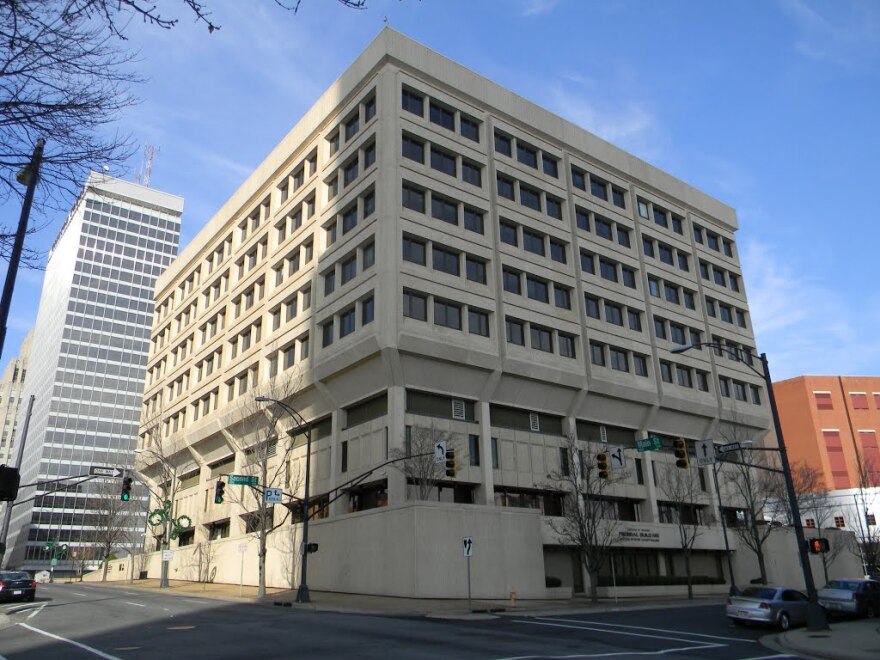Voter fraud, the DMV and North Carolina's chief justice were all part of the arguments Thursday in the federal trial over the state's election overhaul. The U.S. Justice Department, the North Carolina NAACP and other plaintiffs are suing the state over the 2013 changes, which included cuts to early voting and the elimination of same-day registration and out-of-precinct voting. WFAE's Michael Tomsic was in Winston-Salem for day nine of the trial and discussed it with Marshall Terry.
The Republican lawmakers behind the overhaul have said it's designed to prevent voter fraud. What's the latest testimony on that point?
That it is "exceedingly rare."
The North Carolina NAACP called Rutgers professor Lorraine Minnite as an expert witness Thursday. She's been studying this for about 14 years. She says since 2000 in North Carolina, there have been more than 35 million votes cast, but only two instances of the state board of elections referring a case of voter impersonation to law enforcement.
Minnite focuses on that kind of fraud, where an individual intentionally misrepresents who they are, votes twice, that kind of thing.
How did the state's attorneys respond?
They said her definition is too narrow. It leaves out illegal votes connected to poll workers messing up or ballot stuffing. And they said that voter fraud has been as an acceptable reason for registration changes throughout U.S. history. (Think of Boss Tweed and the corrupt political machines of the 1800s.)
They also noted that the U.S. Supreme Court in a plurality opinion found "the risk of voter fraud is real."
What did the expert witness, Minnite, say about all that?
She acknowledged lawmakers may take a broader view and that there are very colorful examples of voter fraud being a bigger problem in our distant past.
But she emphasized there just isn't any evidence of it being an actual problem now. She said that even using a slightly broader definition, the percentage of fraud is essentially zero after you add up how many votes are cast.
It is worth pointing out, however, that the state's attorneys will likely call their own witnesses on fraud later in the trial, so we'll be hearing more about this topic.
Problems at the DMV have also been a hot topic so far. The plaintiffs have given several examples of people who thought they registered to vote there, but later found out they didn't.
I spent some time earlier this week with one of those witnesses, Moses Colbert, who had that exact problem. And the latest example on Thursday actually involves the chief justice of the North Carolina Supreme Court.
Gary Sims of the Wake County Board of Elections told the story of Chief Justice Mark Martin coming in with his daughter to figure out how the DMV dropped the ball on her registration. Apparently, the daughter was convinced that she registered at the DMV, and Martin backed that up. But when it came time to vote early, she was not in the records.
Sims from the board of elections was really frustrated by this. He said this is the kind of thing he has seen "over and over again." For that reason, he believed them. Also, he said if we can't trust that the chief justice of the state Supreme Court is telling the truth about the DMV, then who can we trust about these problems?
The plaintiffs tried to paint this as another example of how same-day registration, which was taken away, is a failsafe that would've keep these types of problems from being an issue.
And how did the state respond to all of that?
In one of the funnier moments of the day, a state attorney said as a lawyer, obviously he wants to give the chief justice the benefit of the doubt. But is it possible his daughter didn't remember her trip to the DMV accurately? Sims acknowledged that's a possibility. There's really no way to know for sure if these folks who come into the election board office did what they said they did.
The attorney also pointed out that for all the noise about the DMV, almost all of its voter registrations went through just fine. Sims said there were roughly 200 cases of problems last year, and that's out of thousands and thousands of DMV registrations.
Looking ahead, what comes next in this case?
The Plaintiffs finish calling their witnesses Friday and then pass to the state. The state will start calling its witnesses. We haven't gotten an idea of how many they will call. But as of now, the estimate is for the trial to finish up late next week.
Also, federal judge Thomas Schroeder announced Thursday he will not rule right after closing arguments. Sometimes that happens in cases that go before judges, ruling from the bench, as it's called. But Schroeder is going to take some time to sort through all this after the trial ends.






